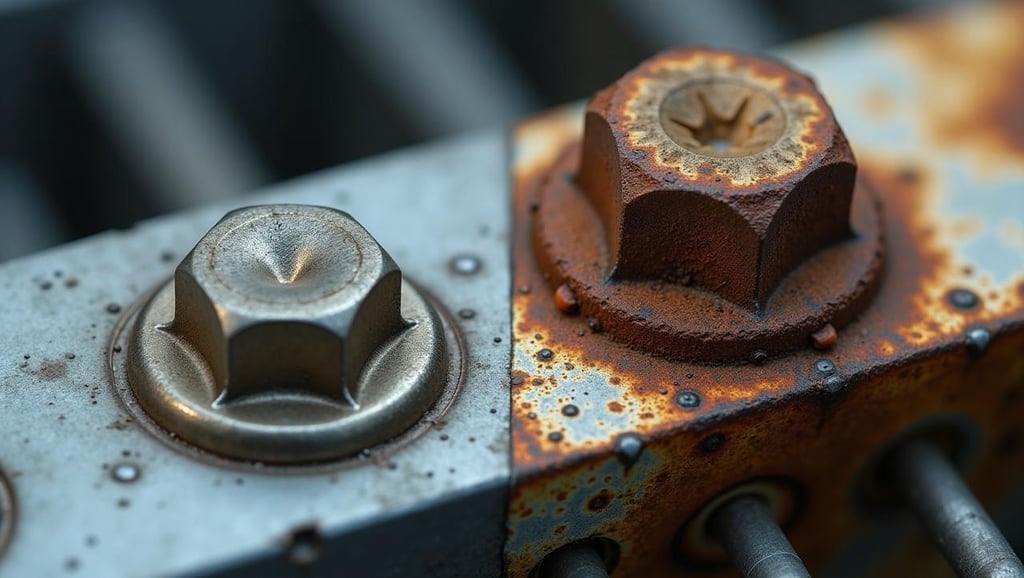Common Fastener Mistakes and How to Avoid Them
Learn about common fastener mistakes, from incorrect torque to mismatched materials. Avoid installation errors & ensure secure fastening with expert tips.
GENERAL & INFORMATIVE ARTICLES


Introduction
Fasteners play a crucial role in construction, manufacturing, automotive, and various industrial applications. However, even the smallest mistake in selecting or installing fasteners can lead to structural failures, equipment malfunctions, and increased maintenance costs. Understanding these common mistakes and how to avoid them ensures durability, safety, and efficiency in your projects.
1. Using the Wrong Fastener Type
Why It’s a Problem
Different fasteners are designed for specific materials and load requirements. Using the wrong type can lead to weak joints, material damage, or even complete failure under stress.
How to Avoid It
Identify the material and load requirements before selecting a fastener.
Use self-tapping screws for sheet metal, wood screws for timber, and high-tensile bolts for heavy loads.
Consult with fastener suppliers or industry standards like ASTM and ISO.
2. Incorrect Torque Application
Why It’s a Problem
Applying too much or too little torque can weaken the fastener or the material it’s securing. Over-tightening may strip threads, while under-tightening can cause loosening under vibration.
How to Avoid It
Use a torque wrench to apply the recommended torque for each fastener type.
Follow manufacturer guidelines or engineering specifications.
Consider thread-locking adhesives or lock washers for added security.
3. Mismatched Materials Leading to Corrosion
Why It’s a Problem
Using fasteners made from incompatible metals can cause galvanic corrosion, which weakens connections over time, especially in outdoor and marine environments.
How to Avoid It
Match fasteners with the same material as the base structure when possible.
Use stainless steel or coated fasteners for corrosion resistance.
Apply anti-corrosion coatings or isolating washers when working with mixed metals.
4. Choosing the Wrong Size Fastener
Why It’s a Problem
Fasteners that are too short may not provide enough grip, while oversized ones can damage materials and reduce holding strength.
How to Avoid It
Measure the thickness of the materials being joined.
Choose fasteners with sufficient thread engagement without exceeding necessary depth.
Refer to size charts and load-bearing capacities.
5. Ignoring Environmental Conditions
Why It’s a Problem
Environmental factors like moisture, temperature, and chemical exposure can weaken fasteners over time, leading to premature failure.
How to Avoid It
Use stainless steel or galvanized fasteners for humid or marine environments.
Select heat-resistant fasteners for high-temperature applications.
Opt for coated fasteners when dealing with chemical exposure.
6. Failing to Account for Vibration
Why It’s a Problem
In high-vibration environments such as machinery, vehicles, or industrial settings, standard fasteners may loosen over time, leading to failures.
How to Avoid It
Use locking fasteners, such as nylon-insert lock nuts or thread-locking compounds.
Implement double-nut techniques or safety wires for critical applications.
Perform regular inspections and maintenance.
7. Overlooking Proper Installation Techniques
Why It’s a Problem
Improper installation, such as misalignment or cross-threading, weakens connections and makes repairs costly.
How to Avoid It
Ensure proper alignment before tightening fasteners.
Use power tools with adjustable torque settings for consistent application.
Train workers on proper installation techniques to minimize errors.
Conclusion
Avoiding these common fastener mistakes can significantly enhance the safety, durability, and efficiency of your projects. By selecting the right fasteners, applying proper torque, and considering environmental factors, you can prevent costly failures and ensure long-lasting performance.
Call to Action
Looking for high-quality fasteners for your next project? Contact Bait Alnuhas today for expert guidance and the best selection of fasteners suited to your specific needs!
